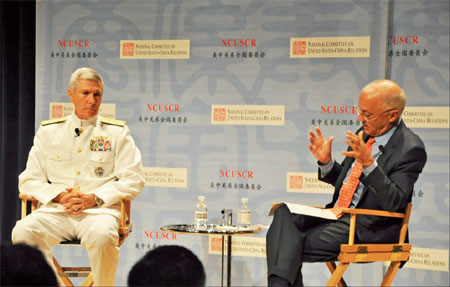Progress in military relations
Updated: 2013-05-22 11:06
By Zhang Yuwei in New York (China Daily)
|
||||||||
|
Admiral Samuel Locklear (left), commander of US Pacific Command, and Stephen Orlins, president of the National Committee on US-China Relations, in New York on Tuesday. Zhang Yuwei / China Daily |
The future military relationship between the world's two largest economies requires "a lot of work on both sides", with miscommunication and miscalculation being areas to avoid, says the Commander of the US Pacific Command.
Admiral Samuel Locklear was speaking at an event organized by the National Committee on US-China Relations in New York on Tuesday.
While competition between the US and China exists, "areas of convergence between our nations far outweigh the areas of divergence", said Locklear, adding the two countries are "making great progress" in military-to-military relations.
"I believe the best hope for sustained bilateral cooperation will come from strategically identifying (those) areas where our interests overlap, and build over time greater understanding and trust between our two armed forces," said Locklear.
"Our approach is to manage friction and disrupt competition."
Quoting Chinese President Xi Jinping's comment that "the Pacific Ocean is big enough for all of us", Locklear said the economic relationship will continue to draw the two countries together.
On the "shared challenge" in the cybersecurity issue, Locklear said the two need to work together to tackle that.
"Cybersecurity is another growing challenge to our relationship where it is essential for the US and China to develop and an understanding and acceptable measure," he said.
"We should manage our differences, expand our cooperation, and work together to ensure that China and the US fully participate in the international system," said Locklear, adding the US does not take any side in international territorial disputes, referring to the Diaoyu Islands dispute between Japan and China.
Locklear listed three key essentials to the future of military-to-military relations between the US and China, including taking into account the interests of other Pacific nations.
"As leaders we cannot be victims of history," he said. "We must move beyond our individual differences to bring consensus to issues that threaten the regional stability and future prosperity.
"We must continue to seek opportunities to have more robust, more predictable and more candid dialogue about current and future security concerns."
Locklear said China should also increase its participation in military-to-military relations, not only with the US but with others across the globe.
"This will build a foundation of trust and mutual understanding," he added.
US-China dialogue forums, such as military maritime consultant meetings, provide routine operations for the two nations to work together to reduce miscalculation, said Locklear.
China's navy will join a US-led joint exercise, Rim of the Pacific Exercise (RIMPAC), for the first time next summer.
The US hopes China's participation in RIMPAC will help build confidence between the countries' navies at a time when both are boosting their military presence in the Asia-Pacific region.
Locklear said the US looks forward to China's joining the exercise in which 22 countries participated last year.
"It's the world's largest international maritime exercise and one that helps promote cooperation not only in the Pacific but also throughout the region," said Locklear.
yuweizhang@chinadailyusa.com

 Michelle lays roses at site along Berlin Wall
Michelle lays roses at site along Berlin Wall
 Historic space lecture in Tiangong-1 commences
Historic space lecture in Tiangong-1 commences
 'Sopranos' Star James Gandolfini dead at 51
'Sopranos' Star James Gandolfini dead at 51
 UN: Number of refugees hits 18-year high
UN: Number of refugees hits 18-year high
 Slide: Jet exercises from aircraft carrier
Slide: Jet exercises from aircraft carrier
 Talks establish fishery hotline
Talks establish fishery hotline
 Foreign buyers eye Chinese drones
Foreign buyers eye Chinese drones
 UN chief hails China's peacekeepers
UN chief hails China's peacekeepers
Most Viewed
Editor's Picks

|

|

|

|

|

|
Today's Top News
Shenzhou X astronaut gives lecture today
US told to reassess duties on Chinese paper
Chinese seek greater share of satellite market
Russia rejects Obama's nuke cut proposal
US immigration bill sees Senate breakthrough
Brazilian cities revoke fare hikes
Moody's warns on China's local govt debt
Air quality in major cities drops in May
US Weekly

|

|








